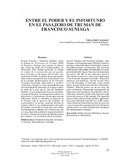| dc.rights.license | http://creativecommons.org/licenses/by-nc-sa/3.0/ve/ | |
| dc.contributor.author | Valera, Dalis Coromoto | |
| dc.date.accessioned | 2014-07-15T14:57:27Z | |
| dc.date.available | 2014-07-15T14:57:27Z | |
| dc.date.issued | 2014-01 | |
| dc.identifier.issn | 0798-1570 / Electrónico: 22448438 | |
| dc.identifier.uri | http://www.saber.ula.ve/handle/123456789/38847 | |
| dc.description.abstract | Román Velandia y Humberto Ordoñez, abren
el diálogo en El pasajero de Truman (2008)
de Francisco Suniaga, para romper el silencio
que oculta una etapa de la historia política de
Venezuela. Esta verdad atesorada, se rompe
en medio de la melancolía por un pasado,
personificado en la figura del hombre que
representa el Poder. La plática de dos personajes,
dada en plena ancianidad, deja al descubierto uno
de los grandes planteamientos de M. Foucault;
Diógenes Escalante, diplomático y político
venezolano, elegido en varias oportunidades para
ser el presidente de Venezuela, es la figura central,
en torno de la cual gira la vida de Humberto
Ordoñez. Con el poder puede observarse también,
el juego de intereses, los manejos burocráticos, las
hipocresías y el alejamiento; hechos que suscitan
reflexiones donde se vislumbra la negación de
lo humano ante el ejercicio del mandato. El
acercamiento a la novela pretende abordar de
manera reflexiva, los planteamientos del poder
devenidos a través de la mirada del autor, donde
ficción histórica e historia real se hacen una sola
voz, para dejar al descubierto la separación entre lo humano y el poder, en un juego de identificaciones que conduce a la reconstrucción de la historia. | es_VE |
| dc.language.iso | es | es_VE |
| dc.rights | info:eu-repo/semantics/openAccess | |
| dc.subject | Detentador del poder | es_VE |
| dc.subject | Infortunio | es_VE |
| dc.subject | Lo humano | es_VE |
| dc.subject | Remembranza | es_VE |
| dc.subject | Nostalgia | es_VE |
| dc.title | Entre el poder y el infortunio en El pasajero de Truman de Francisco Suniaga. | es_VE |
| dc.title.alternative | Between power and misfortune in Truman passenger Francisco Suniaga. | es_VE |
| dc.type | info:eu-repo/semantics/article | |
| dc.description.abstract1 | Roman Velandia and Humberto Ordoñez, open
dialogue on Truman passenger (2008) by Francisco
Suniaga, to break the silence which hides a stage of
the political history of Venezuela. This treasured
truth, breaks in the middle of melancholy for a past,
personified in the figure of the man who represents
the power. The talk of two characters, given in
full old age reveals one of the major approaches
of M. Foucault; Diógenes Escalante, Venezuelan
diplomat and politician, elected several times
to be the President of Venezuela, is the central
figure around which rotates the life of Humberto
Ordoñez. With the power can also be seen, the
game of interests, bureaucratic management, the
hypocrisies and remoteness; facts that give rise to
reflections where the denial of the human in sight
before the exercise of the mandate. The approach
aims to address the novel thoughtfully, approaches
the power-turned through the eyes of the author, where historical fiction and real story become one voice to expose the separation between the human and the power, in a set of identifications leading to the reconstruction of history. | es_VE |
| dc.description.colacion | 87-93 | es_VE |
| dc.description.email | dalisvalera@gmail.com | es_VE |
| dc.description.frecuencia | Semestral | |
| dc.identifier.depositolegal | PP92-0047 | |
| dc.identifier.eissn | 22448438 | |
| dc.publisher.pais | Venezuela | es_VE |
| dc.subject.centroinvestigacion | Centro de Investigaciones Literarias y Lingüísticas Mario Briceño Iragorry | |
| dc.subject.facultad | Núcleo Rafael Rangel (NURR) | es_VE |
| dc.subject.institucion | Universidad de Los Andes | es_VE |
| dc.subject.keywords | Holder of power | es_VE |
| dc.subject.keywords | Misfortune | es_VE |
| dc.subject.keywords | Human | es_VE |
| dc.subject.keywords | Remembrance | es_VE |
| dc.subject.keywords | Melancholy | es_VE |
| dc.subject.publicacionelectronica | Cifra Nueva | |
| dc.subject.seccion | Revista Cifra Nueva: Artículos | es_VE |
| dc.subject.thematiccategory | Artes y Humanidades | es_VE |
| dc.subject.tipo | Revistas | es_VE |
| dc.type.media | Texto | es_VE |


